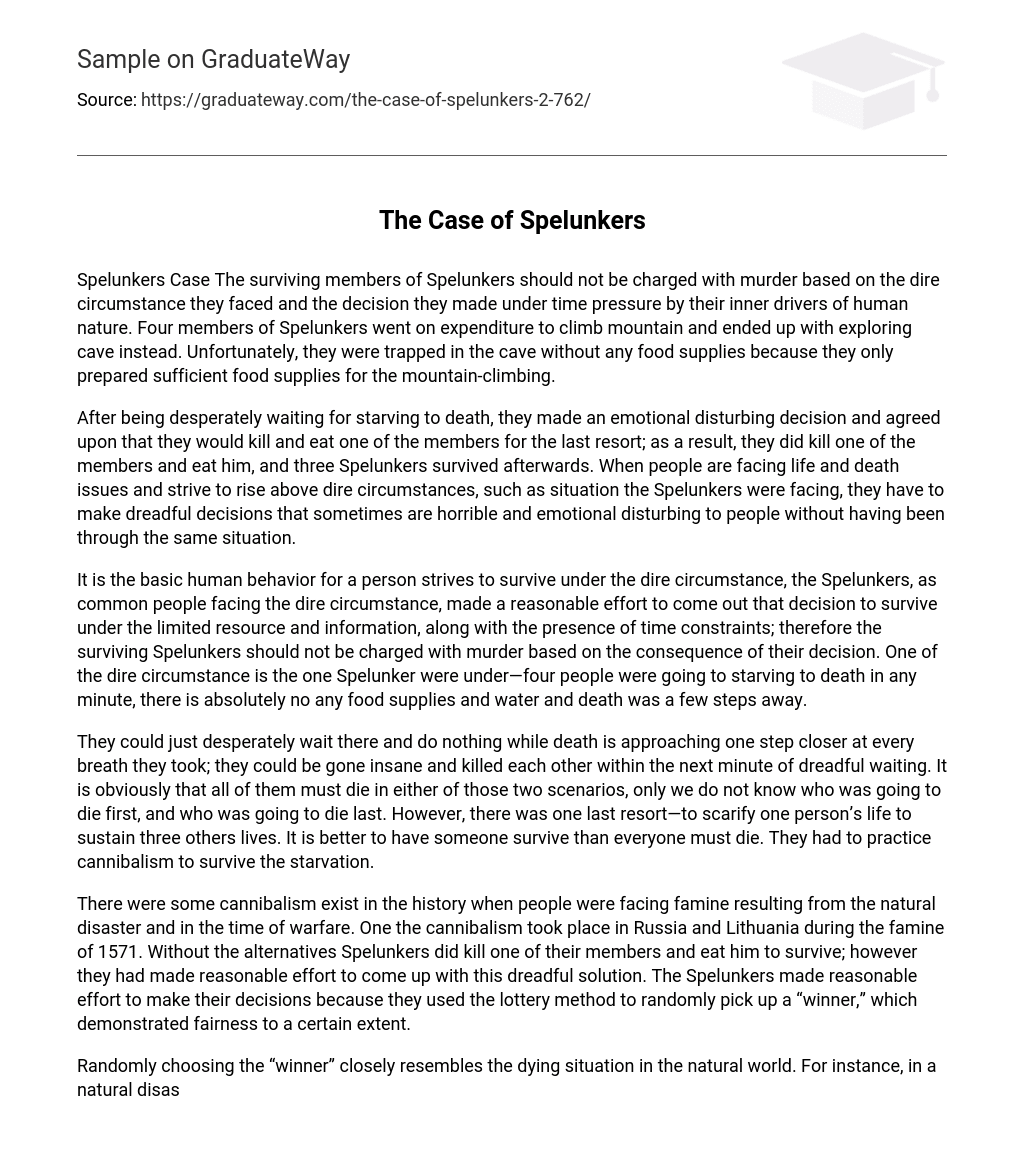The surviving members of Spelunkers should not be held responsible for committing murder. This is because their behavior was influenced by the extreme circumstances they found themselves in and their innate human instincts. Initially intending to climb a mountain, four Spelunkers became trapped inside a cave instead. Regrettably, they did not bring an adequate amount of food with them, as they had only prepared for the mountain excursion.
After anxiously waiting for death by starvation, the Spelunkers made a distressing and emotional decision. They unanimously agreed that their last resort was to kill and consume one of their own. Following through with their agreement, they killed a member and ate him. Remarkably, three Spelunkers managed to survive this extreme ordeal.
When individuals find themselves in life-or-death situations like the Spelunkers did, they are forced to make dreadful choices. These decisions can be deeply disturbing and emotionally traumatic for those who have not experienced similar circumstances.
The Spelunkers, similar to ordinary individuals, found themselves in a critical predicament where their survival instinct took over. Despite having limited resources, information, and time restrictions, they resolved to do whatever necessary to survive. Considering the circumstances they were confronted with – four people on the verge of starvation at any given moment without access to food or water – holding them accountable for murder based on their decision would be unjustifiable.
They could passively await their impending death, each breath bringing it closer; they could descend into madness and turn against each other within minutes of this terrifying wait. Clearly, all of them would die in either of these situations, although the order in which they would perish remained unknown. However, there was one final option—to sacrifice one life to save three others. It was preferable for someone to survive rather than everyone facing death. They resorted to cannibalism in order to ward off starvation.
Some instances of cannibalism have occurred in history, particularly during times of famine brought on by natural disasters or in periods of warfare. In 1571, both Russia and Lithuania experienced such a famine, leading to an incident of cannibalism. To ensure their survival, a group of spelunkers had no alternative but to kill one of their members and consume his flesh. It is worth noting that the spelunkers made a reasonable effort in reaching this gruesome decision. They utilized a lottery method to randomly select a “winner,” demonstrating a certain level of fairness.
Simulating the uncertainty of survival in nature, the act of randomly choosing a “winner” closely resembles the unpredictability observed during occurrences like floods or earthquakes. During these events, individuals within the impacted region have an equal chance of surviving or encountering danger, regardless of factors such as age, gender, or social standing. Likewise, when confronted with critical situations where time is limited and lives are at stake, the Spelunker’s choice to employ a lottery system for selecting a sacrifice showcased their dedication to equity and logical reasoning.
When making decisions, multiple factors are involved such as decision makers’ experiences, resources, information, and problem-solving skills. Time constraints must also be considered. Moreover, decision makers should be in a good physical and emotional state to make rational decisions. In the case of the Spelunkers, they faced limited resources and information while also dealing with hunger. They might have also experienced emotional distress and anxiety.
Their choice represents the optimal decision they could have made, showcasing a fundamental aspect of human behavior – the instinct to survive. This survival instinct is not limited to humans alone but also acts as the motivating factor for all living beings. Abraham Maslow’s renowned hierarchy of needs highlights air, water, and food as crucial metabolic necessities essential for survival in both animals and humans.
Therefore, to maximize the survival of as many people as possible, the Spelunkers made the tough decision to kill and eat one person. The group was on the verge of starvation before reaching this regrettable conclusion. Despite the moral reprehensibility of taking Paul’s life and consuming him, the importance of saving four lives surpassed the sacrifice of one in this dire circumstance.
Thus, the spelunkers acted in the best interests of the majority and promptly took action. It would be unfair to criticize them for killing and consuming one of their members because they made logical choices to ensure their survival in a desperate situation. The instinct to survive is an essential aspect of human nature as well as other living organisms. Although it is morally unacceptable to harm an innocent individual, when faced with limited resources, information, and time in a life or death scenario, we must acknowledge the primal urge for self-preservation influencing human behavior.
Therefore, the Spelunkers should be evaluated based on the reasonable effort they made to ensure their survival. The Spelunkers did not select a particular individual to sacrifice; instead, they resorted to a lottery system for choosing. This method exemplifies their sheer determination to survive, even if it meant taking the life of one of their own. Ultimately, this decision was a consequence of their desperate situation and human instinct. It would be challenging for anyone else faced with a similar predicament to forgo the option of starving to death and instead opt for self-preservation.
If these three men face prosecution, their decision would have been futile. Their decision was made to benefit humanity, as one man’s life was sacrificed to save three others. Any alternative would have resulted in the death of all four individuals. Prosecuting all of them would demonstrate a lack of consideration for their efforts to preserve human life. It was a means of sustaining hope for survival and deemed essential.





